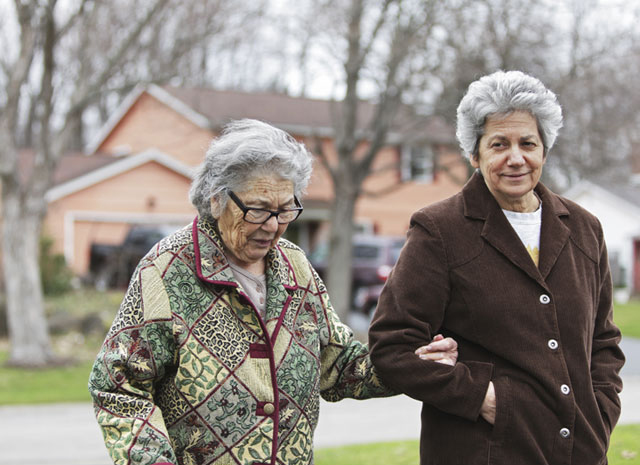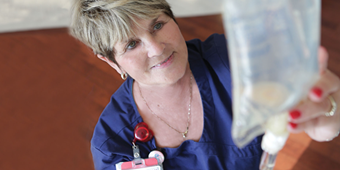10 Self-Care Tips for the Cancer Caregiver

Answer a few questions and we'll provide you with a list of primary care providers that best fit your needs.
As a caregiver for someone with cancer, does it feel like your duties never end? You may be performing so many tasks — transportation, grocery shopping, housework, preparing meals, and assistance with dressing, getting out of bed, eating, or dealing with incontinence issues.
Caregiving can be both stressful and overwhelming, so it’s important to take care of yourself in the midst of caring for a person with cancer. Your physical, emotional and mental well-being are vitally important to the person in your care.
You are not alone. More than 65.7 million Americans serve as caregivers for children or adults, according to the American Association of Retired Persons (AARP) and the National Alliance for Caregiving (NAC). Family and friends provide most long-term care in the home in the U.S.. Only 11 percent of those needing care live in a nursing home or an assisted living facility.
To keep yourself feeling strong in mind, body and spirit, follow these 10 tips:
1) Find Support
When a loved one has cancer and needs your help, it’s not unusual to feel angry, guilty, alone, afraid or sad. You also may feel anxious or stressed. It helps to find other people who are caregivers and talk with them about their experience and how they are coping with caregiving duties.
2) Arm Yourself with Information
Take time to read about your loved one’s diagnosis and treatment options. Talk to a social worker or case manager about insurance coverage and costs of cancer care. Have necessary paperwork in place such as advance directives, a health care agent, power of attorney and a will. These provide peace of mind no matter what the future holds.
3) Take One Day at a Time
Many people feel a loss of control after a cancer diagnosis. By managing each day’s priorities as they come, you can lessen a feeling of not being able to control the outcome. Try to find a new “normal” as you experience changes in your daily routine, finances and social time.
4) Give Your Mind a Break
Renew your mental energy with activities such as spending time with friends or family, being outdoors, resting in a comfortable chair, watching a favorite television program or reading a book. This time to recharge is necessary to help you cope better with the stresses of caregiving.
5) Take Care of Your Body
In order to be strong for your loved one, you need to take care of yourself. Make time to exercise, eat healthy foods, stay hydrated and get enough sleep. Don’t ignore any physical ailments of your own and get regular checkups and screenings. Pay attention if the stress of caregiving is leading you into unhealthy habits, such as smoking, drinking too much alcohol, or using prescription medicine improperly. If you cannot make healthy changes on your own, seek professional help.
Caregiving can be both stressful and overwhelming, so it’s important to take care of yourself.
6) Cultivate a Positive Attitude
Having a positive attitude can help set the tone for all that you do. You may not have control of what happens to you, but you can change how you react. To help you cope, talk with other members of the caregiving team. You may also wish to talk with friends, religious or spiritual advisors, counselors or healthcare professionals.
7) Accept Offers of Help
Make a list of caregiving tasks, both big and small, and accept the help of those who offer. Decide how you can divide tasks among friends, family, professionals and volunteers. You will feel better and help others feel good that they contributed.
8) Explore Stress-management Techniques
Meditation, yoga, listening to music or simply breathing deeply are great ways to relieve your stress. Guided imagery, healing therapies and creative outlets such as art, music or dance all can lower stress, as well.
9) Set Limits
Recognize your own strengths and weaknesses as a caregiver. Know what you can handle on your own and when it’s time to ask for help. No one can do everything. There’s no shame in acknowledging your limits, and it’s better to get a break than to totally burn out.
10) Consider Professional and Volunteer Services
A social worker or care coordinator is a great resource for community programs and services. You may be able to tap into home care, home-delivered meals, transportation, help with everyday activities and advocacy for health insurance or other benefits.
Answer a few questions and we'll provide you with a list of primary care providers that best fit your needs.
Source: Cancer Support Community; Cancer.net




